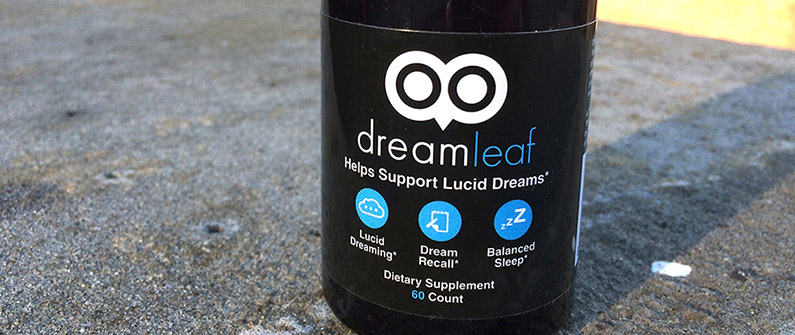Lucid dreaming enthusiasts tend to agree on one thing: The fact that lucid dreaming can be both learned and induced. While there are “natural-born lucid dreamers,” most of the folks currently partaking in the practice have worked hard to get there. If you remember from my lucid dreaming article, there is some evidence pointing to lucid dreaming sleep being more restful than both SWS and REM sleep. In a quest to find the best sleep ever, I decided to give lucid dreaming a try.
Dream Leaf is the the first supplement I tested designed specifically to induce lucid dreams. Calling itself “The World’s Most Advanced Lucid Dreaming Supplement,” Dream Leaf claims to lengthen the duration and strength of REM sleep—the sleep cycle during which lucid dreams can happen— effectively lengthening the window of time during which a lucid dream can happen. The company also makes a more straightforward sleep aid — called Twilune — which I reviewed here.
Read on to find out whether or not I had lucid dreams on DreamLeaf, and whether I think it’s worth giving a shot.
Active Ingredients
This supplement is comprised of two pills — red and blue, so you feel like you’re Neo in The Matrix — meant to work synergistically and to be taken at separate times. While the ingredients for each pill are listed, the amounts are not, as they are both labeled as proprietary blends.
Blue Pill – 160 mg
- Mugwort — An herb closely related to wormwood — one of the hallucinogenic components of absinthe — mugwort has been used in ethnomedicine for its nervine properties, and to treat ailments like rheumatism. It is widely used by lucid dreamers to intensify their dream experience.
- 5-HTP — A byproduct of tryptophan, this chemical helps increase the production of serotonin and has been used to treat insomnia, mood-disorders, migraines, and even binge eating.
Red Pill – 275 mg
- Huperzine-A — This alkaloid is used in Chinese medicine. Huperzine acts as an AChE inhibitor, allowing you to have better access to your memories while you sleep.
- Choline Bitartrate — A chemical thought to improve the production of acetylcholine, an essential neurotransmitter involved in a number of cognitive functions.
- Alpha GPC — Another source of dietary choline, it may also stimulate the production of growth hormone in aging humans.
Additional Ingredients: Gelatin, Water, Titanium Dioxide, FD&C Blue #1, FD&C Red #40, Magnesium Stearate, Rice Flour.
My Experience
There are two methods to the Dream Leaf madness. One involves taking the blue pill before bed, and then setting an alarm to wake up after 4 hours of sleep to take a red pill. Anything involving waking up in the middle of deep sleep doesn’t sound so great to me, so I gave the other method a try first. I took the red pill 4 hours before going to bed, and on the following night, I took the blue pill right before bed.
On that second night, I did have very vivid and detailed dreams, but at no point do I remember being aware of dreaming while it was occurring. I waited until the weekend, and tried the first, and recommended, method: begrudgingly setting my alarm to ring in four hours from the time I went to bed. I took the blue pill, and tried to not think about having to wake up in the middle of the night. I took the red pill, as the alarm went off, and tried to get right back to sleep. And that’s where the magic kinda(sorta) happened for me. I had a super fun dream that involved surfing volcano lava, and very clearly acknowledging that I used to have dreams like that when I was younger, and that I should have dreams like this more often.
Now whether that memory was induced by research, or I actually did used to have lucid dreams when I was young is still a mystery to me, but I do have to admit I remembered having a lot of fun in my sleep. And in spite of all the physical activity, I did wake up refreshed, well-rested and alert.
Pros:
- Lucid dreams are fun
- I felt well-rested and refreshed, even after having woken up in the middle of the night
Cons:
- The most effective method includes waking up in the middle of the night
- The two pills need to be taken separately, regardless of the method chosen
- You may need a little “training” to truly enjoy the experience
Final Thoughts
There are whole communities devoted to lucid dreaming. Those committed to the practice use a number of methods to induce lucid dreaming, including MILD (Mnemonic Induction of Lucid Dreams) and WBTB (Wake Back to Bed). I suspect that I may be one of the natural-borns, so if you don’t have the same experience I did while taking Dream Leaf but want to engage in lucid dreaming, I would encourage you to explore other methods. They may involve pairing this supplement with a one of these methods.
Ultimately, lucid dreaming will vary significantly from person to person, and Dream Leaf is a product that may help some unlock the ability a little more frequently.
